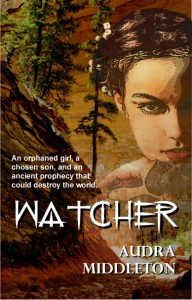 I very pleased to have fellow author Audra Middleton with me on the blog. We recently shared duties as co-facilitators of a session about finding the right critique group at the 2013 Pacific Northwest Writers Association conference. Audra, thanks for being with me today. It’s always good to have a fellow Champagne Books author in the house.
I very pleased to have fellow author Audra Middleton with me on the blog. We recently shared duties as co-facilitators of a session about finding the right critique group at the 2013 Pacific Northwest Writers Association conference. Audra, thanks for being with me today. It’s always good to have a fellow Champagne Books author in the house.
I’m always curious about what jazzes creative artists. Where do you find the inspiration for your writing?
My stories come from my daydreams. If I am bored or stressed out, I escape inside my own mind and become someone else. Next thing you know, I have a whole set of characters playing out scenes in my head. Sometimes these characters and scenes are inspired by real people, places, or events, and sometimes they seem to come out of nowhere. Once inside my head, though, they tend to take on a life of their own and run the show.
What are you reading. Any favorites?
I was nearly finished with The Stand by Stephen King, and then I got mad at him because he sent Tommy to meet the Dark Man and so I put it down. I have since started An Alien’s Guide to World Domination by Elizabeth Fountain, which is a fun read.
Beverly Cleary is one of my favorite authors, because her characters are so vivid. I enjoy reading her books to my kids. Capote and Tolkien are two more of my favorite authors. I also enjoy Stephen King, but I may change my mind about that depending on what happens with Tommy.
What do you find to be the most challenging thing about being a writer? And how do you cope with that challenge?
The most challenging thing for me as a writer has been putting myself ‘out there.’ Letting others read my writing, at first, felt a bit like getting naked in front of them. Once I got used to that, it was time to pitch. After that, I had to start marketing. Every step of the way exposing myself to more people. It’s been challenging, but it’s a lot more fun to share my writing with people than with a file drawer, and that thought is what keeps me going.
What do like the most about being a writer?
I can write pretty much anywhere, anytime – while my monkey boys are bouncing off the walls around me, driving them to baseball games, in the waiting room of the doctor’s office. Even if I don’t have a computer in front of me, I can work through story arcs, dialogue, etc. in my head. The tricky part is making sure I write it all down before I forget it.
What’s something you think your readers would enjoy knowing about you?
Tell us about your current project.
Which of your characters is your favorite? Why?
Thanks for sharing yourself with us today. Is there anything you’d like to add?
Author Bio:
Audra Middleton is a somewhat neurotic and terminally sarcastic author and mother of three from Washington State. She left her teaching career to raise her kids, and in between diaper changes and baseball games, she began writing books.
Mini-Synopsis/Blurb for Watcher:
War threatens to destroy the world of Anthelion unless the holy man, Goran, can solve his prophecy riddle. For every clue he finds, another obstacle surfaces. An orphan girl, Watcher, becomes his responsibility. As if parenthood itself isn’t daunting enough, she keeps a bear for a pet and transforms into her forest surroundings to avoid socialization. Hope momentarily emerges when Goran finds Benaiah, the Chosen Son of the prophecy. Only he soon discovers Benaiah is a social pariah on the verge of embracing darkness.
When Benaiah and Watcher unexpectedly meet, the two outsiders find in each other a sense of belonging they’ve never known. Now their emerging love promises to bring about the very war Goran is struggling to prevent.
Excerpt for Watcher:
“She blocks her thoughts,” he whispered, surprised.
“Yes. I’ve no idea what goes on in that fool head of hers.”
Ben became flushed with anger. It was rare to find someone he could not read. To have constant knowledge of others’ thoughts was maddening, tedious, and altogether lonely. He had been living in near seclusion on the farm for almost three years, escaping the thoughts of men, resting from the war. He would have appreciated the company of someone he could not read.
“Why have you kept her from me?” he asked, angrily.
Goran laughed.
“You assume I have some sort of influence on that creature. I tried to find a proper home for her in the village throughout her childhood. Every time I tried, she hid in the woods for days. I finally decided God put this kernel in my teeth for a reason. She comes and goes as she pleases, but she has never left Willowbrook Wood until now,” Goran explained.
Benaiah let go of Goran’s arm. Watcher was now several paces ahead, determined to show them she was not crippled by her embarrassing fall.
“I did not give you permission to wear my cloak,” he taunted her, knowing from the flashes of pink he saw as she fell, she had nothing on under.
Watcher glared back at him and walked toward the edge of the woods again. She walked face first into the first tree she came to, dropping the cloak as she became bark, then trunk wood, then bark again on the other side. Watcher called softly to her pet, hoping he did not get hungry and wander off. Having smelled the man in the water, it made him uneasy when she left toward the clearing. He was not far off when she called.
“Thank you, Kitty. Off you go, I’ll be all right for a while,” she whispered, as she grabbed her pack, slipped on her own cloak, and returned to the clearing.
Ben once again stopped in his tracks.
“How did she do that?” he asked.
Goran shrugged. “Her gift.”
“What sort of creature walks through trees?”
Goran shook his head. “I am afraid you are about to find out.”
He thought for a moment about warning Benaiah not to become distracted, not to lose focus of his duties soon to come, but he had grown weary of being the messenger of such foreboding. She would most likely be gone within the week, after all.
Buy Links for Watcher:
Amazon:
http://www.amazon.com/Watcher-ebook/dp/B00AXVCA0E/ref=sr_1_1?s=books&ie=UTF8&qid=1357578822&sr
Champagne:







